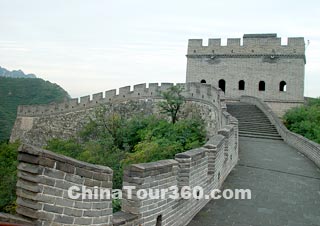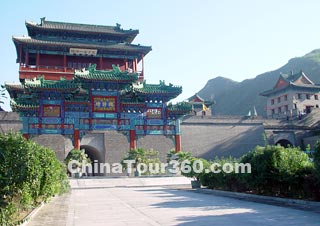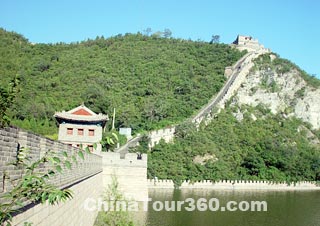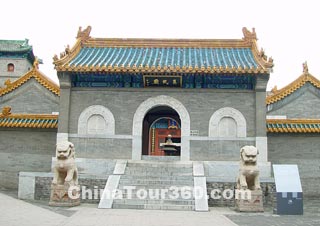Great Wall Hiking Tour
"Juyongguan Great Wall Hiking"
- Code: GW03
55 km away from Beijing city and on the way to Badaling Great Wall, there is a canyon where the famous Juyongguan Pass is located. Because of the steep terrain, Juyongguan Pass occupied a very important place in the defense system of Beijing and had been heavily guarded in every dynasty. It was called the Most Formidable Pass under Heaven since the old times. Today you will hike on Juyongguan Great Wall.
The Great Wall we see today was built in 1368 of the Ming Dynasty and has been repaired in 1992. Unlike other continuously stretching parts, Juyongguan great wall is a circle of 4,142 meters. There are about 28 watchtowers on it and the highest one is about 620 meters above the altitude and 380 meters higher than the lowest one. The width of the great wall also changes greatly. The widest point is 16.7 meters and the narrowest point is only 1.2 meters. You can start your Juyongguan Great Wall hiking tour from the north or the south end and there is a pass at each end.
|
|
The pass is combined by the gate tower, the bulwark and the great wall. Cannon was widely used in the civil wars in the Ming Dynasty and the foundry skills had reached the highest level. There are 5 ancient cannons displayed on each of the gate tower and the biggest one has a 1.7 meter barrel and 15 centimeter caliber. The function of the bulwark is to lure the enemy inside in order to trap and kill. In the bulwark of the South Gate Tower, there is a small-scale Temple of Guan Yu which was built in 1436. Guan Yu (163-219) was a hero of Three Kingdoms Period and was worshiped as the God of War after he died. The emperor wanted his solders to be as brave and loyal as Guan Yu and keep the pass impregnable.
Outside the South Pass, there is the Ying'en Archway where the officers and soldiers used to greet the messengers of the emperor who came with the rewards after each victory. After going through the 31.8 meters South Gate Tower, you will see an archway named Guoji which means national affairs. It indicated the strategic importance and significance of Juyongguan Pass.
The next on your way is the famous Clouds Platform. It was built in 1342 of the Yuan Dynasty and used to be the base of three Lama Pagodas. At the end of Yuan and the beginning of Ming Dynasty, the pagodas were destroyed because of the war. Then a Buddhist Temple was built on it and again was burnt down in 1702 of the Qing Dynasty. Now only the Clouds Platform is left to tell the history. The stone carvings about Buddha on the platform are real master works. And the Tuo Ronnie Sutra Mantras and incantations carved in six ancient languages including Sanskrit, Tibetan, Phags-pa, Uihur, Tungusen and Chinese, provide priceless materials for study.
|
|
Continue walking towards the North Pass, you will find Juyongguan Pass Ancient Inn on your right. It is a 4-star hotel with quadrangle wooden dwellings style. The average room rate is about CNY400.00 per room per night with free access to the great wall.
On your left, across the parking lot and the high way, is the Town God's Temple. It was built in the late 14th century and renovated in 1765 and 1997. Ancient Chinese believed that everything had a corresponding god and the Town God was the one who protected the city from evil. Emperor Zhu Yuanzhang officially conferred the title of the Town God and completed its worship system. So the faith to the Town God had reached its heyday in the Ming Dynasty. On every first and 15th days of a month, or if there is any natural disaster, people would go to the temple and pray. The new local official would do the same before taking office. Grand ceremonies would be held on the birthdays of the Town God and his wife. And the God's statue would be carried out for a parade on holidays. Those are why the Town God Temple is the biggest one at this area.
In the bulwark of the North Gate Tower, you will find Zhenwu Temple which was built in 1425. Inside there are statues of the great Taoist Zhenwu God, twelve Chinese Zodiacs and the Gods of water and fire.
The ticket is CNY45 per person in travel high season and CNY40 in low season. The opening time is from 08:00 to 17:00 and from 08:30 to 16:00 respectively. You can take subway No. 13 to Longze Station, or express bus No. 345 from Desheng Gate to Shahe Station, or bus No. 883 from Desheng Gate to Nankou East Street, and then change to bus No. 68 to reach Juyongguan Great Wall. If you drive your own car, please follow G6 Jingzang Highway and get off at exit No. 46.
- More Great Wall Hiking Tours:
- Badaling Great Wall Hiking
- Mutianyu Great Wall Hiking
- Jinshanling Great Wall Hiking











